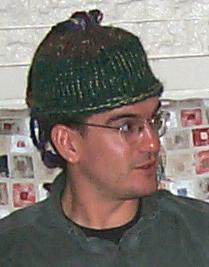 This spectacular bit of tomfoolery was cooked up
by Jos Claerbout with a little help from his friend Andy Bates.
This spectacular bit of tomfoolery was cooked up
by Jos Claerbout with a little help from his friend Andy Bates.
 This spectacular bit of tomfoolery was cooked up
by Jos Claerbout with a little help from his friend Andy Bates.
This spectacular bit of tomfoolery was cooked up
by Jos Claerbout with a little help from his friend Andy Bates.
Jos noticed that the WWW exhibits a massive volume of bad grammar, and he also noticed that zillions of examples of bad grammar are readily found using any search engine such as Lycos or Alta Vista.
He cooked up a perl script that would use Lycos to find pages with a specified grammatical error and also to look for a "mailto" on the offending page. During the testing, Jos did not quite dare automate everything for fear that he might have made a blunder and for even greater fear of a barrage of hostile return mail. To prevent this, the perl script brings up a couple lines of the page with the error for verification by the schemers. Then at the push of a button, a letter would be sent. He could check and send up to about a dozen emails a minute.
His first letter was for people with pages that failed to correctly distinguish between "loses" and "looses". Here it is:
Hey there, I just wanted to let you know about a typo in your page. It appears that you've spelled the word "loses" incorrectly, spelling it "looses" instead: ::: "Looses" is not the same as "loses," and when used as a verb means "to let loose," or "to free from restraint." Granted, "loses" does rhyme with "chooses," which does have two "o"s, but such inconsistency is the price we pay for not speaking Esperanto. On the Web though, the word most often appears as a typo. Unless, of course, by "Spammer Looses Case in Court," you mean that the spammer actually threw a suitcase at the judge, or let loose a serious case of the sniffles. Such things are possible, I suppose, just not very likely. You may be saying "But what does it matter?" As you can tell from my name, such a question strikes deep into my heart. Grammar is my very soul. And it's in yours as well, when you think of what truly separates us from the apes. Some would argue opera, but I would heartily disagree. Almost anyone can play a French horn, but it takes a species of true breeding to differentiate "that" from "which" and to make such clever use of apostrophes. Join me in this battle. Elevate our kind. Eternally vigilant, The Internet Grammarbot
Responses of non-native English speakers were generally thankful and humble. Native speakers, on the other hand, tended to write long letters disagreeing about what separates man from the apes.

He still feared that wholesale use of his grammarbot might evoke a deluge of hostile responses (along with the appreciative ones.) Not wanting to cause any trouble for his friends (or employer) who loaned him resources, he was very careful. If he was going to automate the sending of zillions of emails correcting people's grammar, he thought he might need to hide his identity. He had to learn the tricks that spammers know. He arranged to have all return mail sent to a place known as "ragemail". Then he was ready for his next audacious bit of grammar correcting, the word "get's" with an apostrophe.
The letter below leaves me speechless. He had already sent out his first trial mailing. Would he have the audacity to mass mail it? Unknown to all of us, time was running out. Here is what he had prepared for the "get's" sinners:
Hi there! I just wanted to let you know about a typo on your page. Grammatical mistakes make it difficult for people to understand you, and may cause your site to lose credibility with its readers. ::: The error I'm talking about is the use of the word "get's." "Gets" means to "to gain possession of," or "achieve." It never, never, never has an apostrophe. I know, apostrophes frequently seem to come before the letter "s," but not always. Apostrophes are a lot like pubic hair: appreciated and helpful when placed correctly, surprising and distressing when found somewhere unexpected. An apostrophe in the word "gets" is akin to finding a patch of curly hair on the inside of your knee. So when should you use apostrophes? There are three appropriate uses. One is to denote possession: "These crabs are not mine; they are Laura's!" Another appropriate use of apostrophes is to indicate that the word is a contraction (a combination of two words), and thus some letters are missing: "I'll (I will) never use those sheets again." Finally, apostrophes can be used (very rarely) to indicate that a noun is a plural. This is used most frequently for letters and numbers: "I don't care how many A's she got on her report card, this is just gross." Whenever you use an apostrophe, think about why you're doing so. Don't just toss them in for flavor. If all of this seems somewhat silly to you, please disregard this letter with my apologies. As a lowly grammarbot, I can be somewhat single-minded. However, if you care at all about how people evaluate your intelligence, then please, please, heed my words and correct your site. All of humanity will thank you. My life's goal is to make sure that you're communicating as effectively as possible. If that's a crime, then I'm guilty, guilty as a mangy hound! Yours in grammar, The Internet Grammarbot P.S. - I thought you might appreciate my list of the swankest grammar sites on the Web: http://webster.commnet.edu/HP/pages/darling/ http://www.grammarlady.com http://www.m-w.com
OK, OK, so you think this is all a made up story? You don't believe the grammarbot is real, and you'd like me to prove it works? Or you wonder what the world thinks of having its grammar corrected? I'm not sure exactly how you do it, but I think all you need is the perl script. Maybe you'd like to see his working directory too. It should be all here. It looks like about a dozen "get's" sinners did get a letter from the grammarbot before his time ran out.
One more thing: If you plan on sending many letters, and want to peruse the replies, you might want to learn more about "ragemail" and get your own account there. Too bad we can't find the replies that Jos collected.
We'll just need to find a reader out there on the WWW to pick up
where Jos left off. How about you?
-Popster